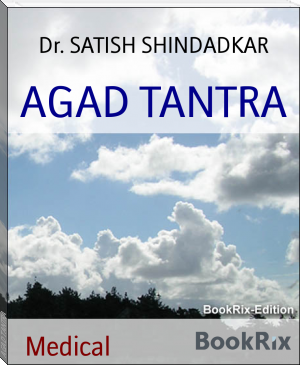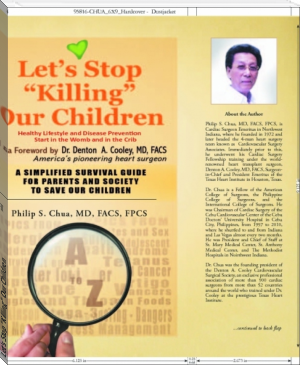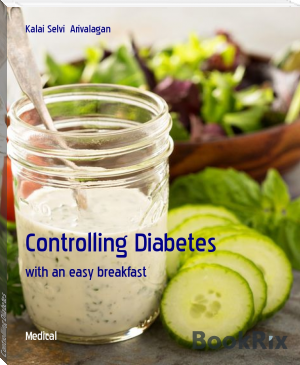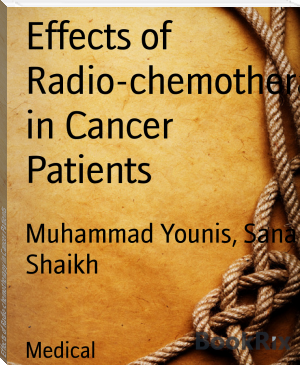AGAD TANTRA, Dr. SATISH SHINDADKAR [web based ebook reader .txt] 📗

- Author: Dr. SATISH SHINDADKAR
Book online «AGAD TANTRA, Dr. SATISH SHINDADKAR [web based ebook reader .txt] 📗». Author Dr. SATISH SHINDADKAR
लहान मुले शतपदींना त्यांच्या वेगळेपणामुळे हाताळतात म्हणून ते मुलांसाठी अतिघातक ठरते.
शतपदीचे विष डोळ्यात गेल्यास नेत्रशोथ, लालीमा, Corneal ulcer किंवा अंधत्वही येऊ शकते.
त्वचेच्या संपर्कात आल्यास हे विष विस्फोट निर्माण करते.
प्राथमिक चिकित्सा - जलाने धावन करावे. नेत्रगत लक्षणांची चिकित्सा लाक्षणिक स्वरूपात करावी.
मक्षिका
विषाधिष्ठान - मुखसंदंश
प्रकार- सहा (सुश्रुत)
लक्षणे :
मक्षिका दंशामुळे शोथ, दाह, कण्डू ही लक्षणे उत्पन्न होतात. यांपैकी स्थालिका व काषायी यांचा दंश प्राणहर आहे त्यांच्या दंशाने दंशस्थानी कुष्णवर्णी पिटीका उत्पन्न होते. ज्वर येतो व मनुष्य मृत्यू पावतो.
चरकाचार्यांनी ज्वर व मूर्च्छा ही दोन लक्षणे वर्णन केली आहेत.
चिकित्सा : दंशस्थानी पीडन करून मुखसंदंश काढून टाकावी. त्यानंतर शामक अगदांचे लेप करावेत.
आधुनिक मतानुसार, अनेक विषारी मक्षिकांचा अभ्यास करण्यात आलेला आहे. त्यापैकी अफ्रीकेत सापडणारी त्से-त्से माशी निरनिराळ्या प्रकारचे ज्वर व Sleeping sickness उत्पन्न करते.
***
गृहगोधिका
विषाधिष्ठान - दंष्ट्रा व नख
प्रकार - सहा (सुश्रुत)
लक्षणे - विषारी गृहगोधिका दंशाने शोफ, तोद व स्वेद ही लक्षणे निर्माण होतात.
सहा प्रकारांपैकी सर्षपिका ही प्राणहर गृहगोधिका आहे.
चिकित्सा : रजन्यादि अगद, दशांग अगद यांचा वापर करावा.
आधुनिक मतानुसार, Lizard च्या विषाक्त जाती भारतात आढळत नाही. विषाक्त Lizards या पश्चिम मेक्सिको व मध्य अमेरिकेत आढळून येतात.
दंश लक्षणामध्ये दंशस्थानी तीव्र वेदना, स्थानिक लसिका ग्रंथी शोथ ही लक्षणे दिसतात तर सार्वदेहिक लक्षणांमध्ये स्वेदप्रवृत्ती, कर्णनाद, हृल्लास, छर्दी, ECG changes, दौर्बल्य इ. लक्षणे दिसतात. त्यांची लाक्षणिक चिकित्सा केली जाते.
***
पिपीलिका
विषाधिष्ठान - मुखसंदंश, प्रकार- सहा (सुश्रुत)
लक्षणे - दंशस्थानी शोथ, तीव्र दाह ही लक्षणे दिसतात.
चिकित्सा - कृष्णवल्मिक मृत्तिका (वारूळाची काळी माती) गोमूत्रात भिजवून दंशस्थानी लेप करावा.
आधुनिक मतानुसार, दंशस्थानी शोथ, दाह, कण्डू, विस्फोट इ. लक्षणे वर्णन केली आहेत.
अनेक ठिकाणी दंश झालेला असल्यास किंवा अनेक पिपीलिकांना एकाच वेळी दंश केलेला असल्यास तसेच allergic लोकांमध्ये हृल्लास, छर्दी, स्वेद, cyanosis, श्वास ही लक्षणे उत्पन्न होऊ शकतात.
यांची चिकित्सा करताना दंशस्थानी शीत उपचार hydrocortisone चे स्थानिक लेपन, मुखाद्वारे anti histimines चा वापर करावा.
***
मशक
विषाधिष्ठान - मुखसंदंश, प्रकार-पाच (सुश्रुत)
लक्षणे : तीव्र स्वरूपाचा कण्डू.
पार्वतीय मशकाचा दंश असाध्य वर्णन केला आहे.
चिकित्सा : वारूळाची काळी माती गोमूत्रात मिसळून लेप करणे.
आधुनिक मतानुसार, मशक हे मलेरिया, फिलारियासिस, यलो फीवर, डेंग्यू इ. आजार पसरवण्यासाठी Vector चे काम करतो.
***
मण्डूक
विषाधिष्ठान : दंष्ट्रा व नख
प्रकार - 8 (सुश्रुत)
लक्षणे : दंशस्थानी कण्डू, मुखातून पीतवर्णी फेनस्त्राव
चिकित्सा : मेषश्रुंग्यादि अगद (सुश्रुत) लाक्षणिक चिकित्सा करावी.
***
लुता
विषाधिष्ठान : लालास्त्राव, मल, मूत्र, मुखसंदंश, नख, शुक्र, आर्तव.
प्रकार : 16 सुश्रुत - यापैकी 8 कृच्छ्रसाध्य, 8 असाध्य
लक्षणे : दंशस्थानी कोथ, रक्तस्त्राव, ज्वर, सर्वांगदाह, अतिसार, त्रिदोषज विस्फोट, मण्डलकुष्ठ, श्यावशोथ इ. निर्माण होतात.
चिकित्सा :
सविष लुतेद्वारे दंश झालेला असल्यास दंशस्थानी छेदन करावे.
नंतर विविध अगदांचे लेपन, धावन, दहन, परिषेक, रक्तमोक्षण, वमन, विरेचन, नस्य, अंजन, धूम, बस्ती इत्यादी आवश्यकतेनुसार करावेत.
आधुनिक मतानुसार 34000 पेक्षा अधिक spiders च्या जाती-प्रजाती आहेत. त्यापैकी फारच थोड्या मनुष्यासाठी घातक आहेत.
यांच्या दंशाने neurotoxic व haemotoxic लक्षणे निर्माण होतात त्यात प्रामुख्याने दंशस्थानी दाह, तोदवत वेदना, बाधीर्य, शोथ निर्माण होतात. तर काहींमुळे दंशस्थानी कोथ उत्पन्न होतो.
***
कीट
विषाधिष्ठान : लालास्त्राव, मूत्र, मल, मुखसंदंश, नख, शुक्र, आर्तव
प्रकार - एकुण 67 (सुश्रुत)
वातज पित्तज कफज सन्निपातज
18 24 13 12
लक्षणे : वातज, पित्तज आदि प्रकारानुसार तद् दोषांची लक्षणे-व्याधी उत्पन्न होतात.
चिकित्सा : स्वेदन, लेपन, परिषेक इ. करावे. मूर्च्छा असल्यास शीतोपचार करावेत.पुन्हा पुन्हा शोधन करून विषघ्न उपचार करावे. तीक्ष्ण दंशामध्ये सर्पविषाप्रमाणे चिकित्सा करावी.
14) प्रदुषणजन्य विष
Poisoning due to pollution
Poisoning due to pollution can be considered as another special type of poisoning.
Use of other poisons is done for specific intention by an individual but poisoning due to pollution is not under control of a single person.
Many chemicals are released in atmosphere from industries and household wastes. They pollute air, water and soil. As these are important for maintenance of ecological balance and social health, the problem should be considered seriously.
This problem is a social problem, it cannot be solved individually. Water purification can be done at smaller scale. But air, soil etc. can't be purified totally. Hence to fight with those we have to increase our immunity.
Poisoning due to pollution can be considered as pollution or contamination of air, soil & water.
Water Pollution :
Pure uncontaminated water does not occur in nature.
It contains impurities as natural impurities and man-made or unnatural impurities.
Natural impurities : These are not essentially dangerous.
There are :
Dissolved gasses (e.g. nitrogen co2, H2s, etc.)
Dissolved minerals (Mg, Na, etc)
Suspended impurities. (Sand, mud, clay)
Microscopic organism.
Unnatural impurities : These occur due to human activity-urbanization & industrialization.
These are :
Sewage-containing decomposable organic matter and pathogenic agent.
Industrial and trade waste- containing, toxic agents ranging from metal salts to complex synthetic organic chemicals.
Agricultural pollutants - Heat and radioactive substances.
Water related diseases :
They can be called as water borne diseases.
A) Biological
1)Presence of infective agent
Viral
Viral hepatitis, poliomyelitis, diarrhea in infants
Bacterial
Typhoid, bacillary dysentery, cholera
Protozoal
Amoebiasis, giardiasis
Helminthic
Round worm, thread worm
Leptospiral
Weil's disease
2) Presence of aquatic host
Snail
Schistosomialis
Cyclops
Guinia worm
B) Chemical e.g. heavy metals, dangerous solvents etc
Spread of infections through stagnant water
Purification of water
Large scale
Storage
filtration
Disinfection-chlorination
Small Scale
Boiling.
Chemical
Disinfection :
Bleaching powder
Chlorine solution
Chlorine tab
Iodine
KMnO4
Air Pollution :
Air pollution is social problem. It cannot be avoided totally. Hence to study the causes and solutions of air pollution is essential to minimize it.
Sources :
Automobiles- emits hydrocarbons, CO, lead, No2, Particulate matter.
Industries.
Domestic sources.
Tobacco smoke.
Miscellaneous.
Air pollutants :
Co Hydrocarbons
So2 Cadmium
lead H2O
Co2 Ozone
Particulate Matter
Effects of air pollutants on human health :
Impair respiratory system.
Oxygen carrying capacity of blood is decreased, fatigability
Loss of memory.
Prevention & control of air pollution :
WHO recommends following procedure.
Prevention to escape toxic substance in ambient air.
Replacing the technological methods causing air pollution by new processes not causing pollution.
Dilution.
Keeping high chimneys.
International action to deal with air pollution on a world wide scale, the WHO has established an international network of laboratories,
for the monitoring and study of air pollution.
Disinfection of air :
Mechanical ventilation.
UV radiations.
Chemical mists : Tri ethelene glycol vapours have been found to be effective bactericides.
Dust control.
Soil Pollution :
India is developing country. Most of the population has occupations related to agriculture. Due to large population demand of food is more for more production. It is essential to use fertilizers, insecticides etc. in agriculture; which affects soil.
Pollutants of air, water also pollute soil.
Causes :
Natural :
Minerals - Cal, Mg, Na, other metal salt etc.
Microscopic organisms.
Unnatural :
Agricultural - fertilizers, insecticides, pesticides.
Industrial waste - Released on open grounds, in river etc.
Household waste - Like soap water, etc.
Due to air pollution - Acid rains can pollute soil.
Effects of soil pollution on human health :
These effects are direct and indirect.
Direct effects occur through soil contaminated water.
Indirect effects occur through food from polluted soil.
Those effects are hormonal defects, GIT disorders, infections etc.
Prevention and control of soil pollution.
Use of fertilizers and insecticides as per expert advice.
Acts regarding pollution should be followed strictly.
Improvement of immunity.
15) विषसंबंधी कायदे Laws related to poison
Poisons act 1919 :
The govt. may prohibit, except under license the import, possession or sale of any specified poison.
Drug and cosmetics act 1940 :
[After the amendment of 1964, it also includes the Ayurvedic and unani drugs.]
The act regulates the import, manufacture, distribution and sale of drugs and cosmetics.
Under this act are constituted the drugs technical advisory board, Ayurvedic and Unani drugs technical advisory board, the drugs consultative committee & central drug laboratory.
No person shall import or manufacture for sale any medicine, unless it is displayed on its label or container either the true formula or a list of ingredients contained in it.
Inspectors can be appointed to inspect the premises where the drugs are being manufactured and he can collect samples.
The biological and other listed products can only be imported under a license.
Narcotic Drugs and Psychotropic substances Act 1985 and Prevention of Illegal traffic in NDPS Act, 1988.
These acts, amend, strengthen and enhance the penalties regarding narcotic drugs of psychotropic substances in relation to their trading and trafficking.
A psychotropic substance in one that alters mental function e.g. LSD, barbiturates etc.
A narcotic drug means cocoa leaf, cannabis, opium etc and synthetic drugs from them.
Pharmacy act 1948 :
This act was enacted for better regulation and practice of pharmacy and for setting up of pharmacy councils.
Accordingly pharmacy council of India and the State Pharmacy Council are formed. Registration of the pharmacists is compulsory.
A person who is not a registered pharmacist cannot compound, prepare, mix or dispense a medicine. However this does not apply to the RMP who dispense drugs for his own patients.
Dangerous Drug Act 1930 :
Dangerous drug - includes coca leaf, hemp, opium and all manufactured drugs.
No one shall cultivate any coca plant or gather any portion of coca plant.
Manufacture or possess prepared opium.
Transport, sell, preparation of opium, heroin, cocaine, coca leaf etc.
Import, Export or transport of opium.
Manufacture medicinal opium or any preparation containing-Morphine or cocaine.
***
Duties of a Registered Medical Practitioner in suspected poisoning
The duties are of two types:
Medical: Care and treatment of patient.
Legal: Assist the police to determine the manner of death.
Doctor should note age, sex, address, date and time of arrival, identification marks etc. of the patient.
In case of suspected homicidal poisoning, Doctor must confirm his doubt before expressing his opinion.
Other Important points :
(a) Try to save the life of the patient and give emergency necessary treatment.
(b) If necessary, the patient should be sent to a better hospital, if possible a government hospital, if the condition of the patients demands and permits the shift.
(c) To take a detailed history of the case – e.g. All symptoms, the progress, it is related to any food or drink ; whether the number of sufferer is more than one, whether any treatment was already given and whether there is any history of previous poisoning.
(d) The doctor should himself record full history of the case, signs, symptoms and progress.
(e) The doctor should collect and preserve the vomitus, stool, urine, clothes stained with poison or vomitus, doubtful container with remaining part of the poison, if any, and if necessary blood, for laboratory investigations.
(f) The doctor should arrange for a reliable attendant of his own choice, for patient.
(g) The doctor should inform the police station of the area about the case irrespective of whether the patient survives or dies and whether it appears to be a case of suicide or homicide or accident.
(h) If death is apprehended then arrangement for recording dying declaration should be made.
(i) In case of death, death certificate should mention about the poisoning or suspected poisoning with recommendation for post-mortem examination.
The doctor in cases of poisoning should not refuse to treat the case due to fear of legality. He should treat the patient efficiently and adhere to the other legal duties like removal of the patient from the source of poisoning, proper collection of the material for analysis, reporting the matter to police officer or magistrate where required, recording of dying declaration if needed, handing over the dead body if the person dies to police for further investigation in the event of death without issuing death certificate.
A doctor in the Govt. job is bound to inform the police officer about the cases of poisoning irrespective of suicidal, homicidal or accidental.
However, if a medical practitioner in private practice is convinced that the patient upon whom he is attending is suffering from homicidal poisoning he is bound under section 39 Cr PC to communicate it to the nearest police officer or Magistrate. Non-compliance is punishable under section 176 IPC. He is not liable for giving notice if case has already been registered with police officer by village head or watchman u/s 40 Cr PC. A private medical practitioner is not bound to supply information on his own according to police officer or magistrate if he is sure that his patient is suffering from suicidal and accidental poisoning because this is not included in section 39 Cr PC. But he has to give information about the case if he is summoned u/s 175CrPC. If he conceals any information he is liable for prosecution u/s 202IPC. If he supplies false information he can be prosecuted u/s 193IPC.
It is advisable to maintain a proper written record of his findings and treatment administered, this is useful to the physician in the court as well. In a suspicious case of acute poisoning, the medical practitioner must try to find out the nature of suspected poison, so that he can at once administer the appropriate treatment and save patient's life. In a case where he suspects slow poisoning by administration of small doses at varying intervals, he should make a very careful note of all the symptoms exhibited by the patient.
A medical practitioner must also preserve any other evidence of suspected poisoning like bottle, cup, glass, piece of paper used for wrapping and dispensing





Comments (0)